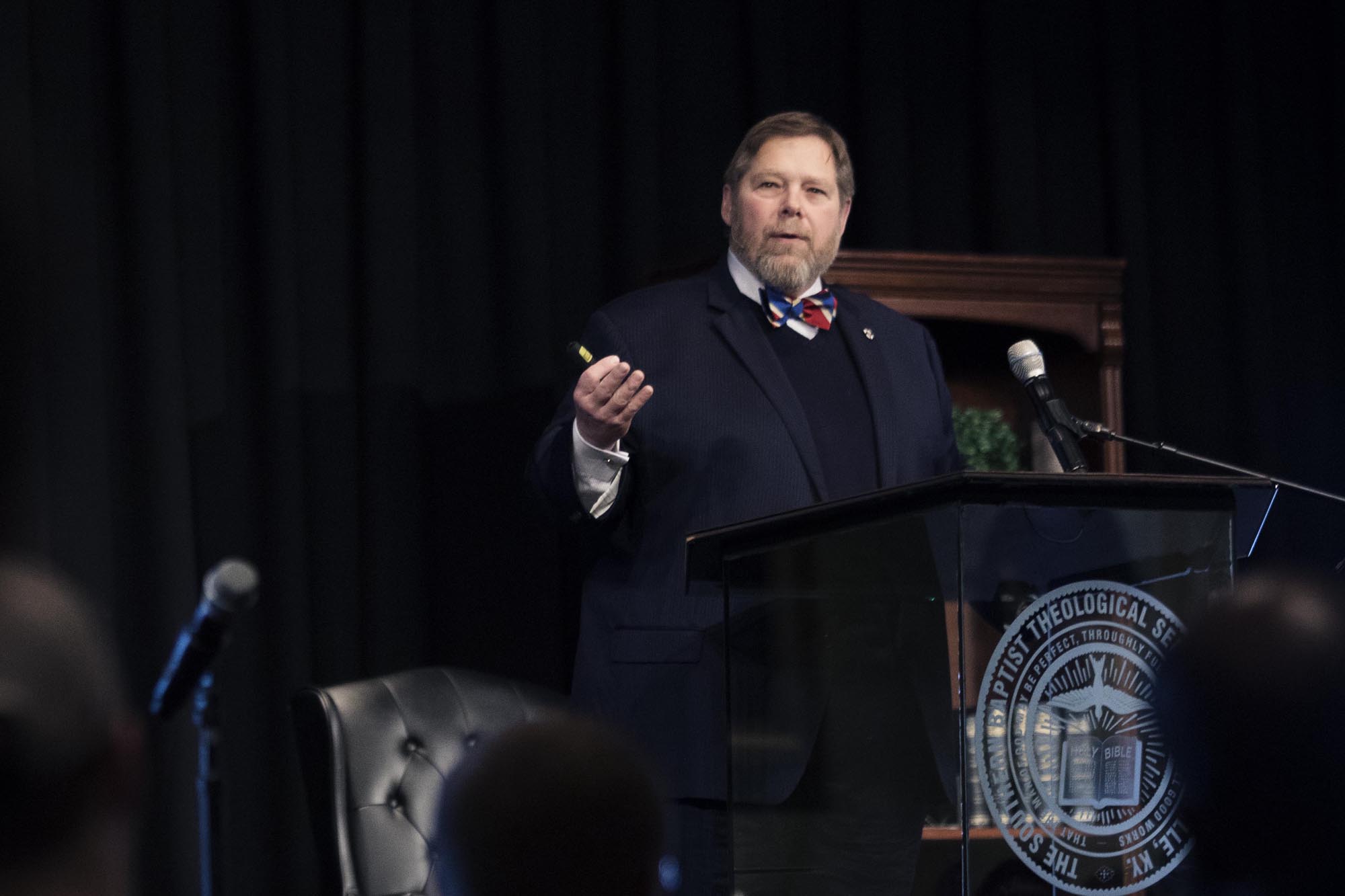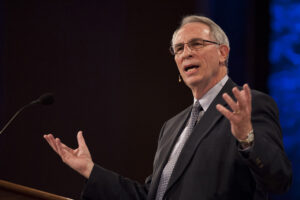
LOUISVILLE, Ky. (BP) — Theological reflection must counteract an uncritical approach to technological advancements that threaten human existence, bioethicist C. Ben Mitchell said in a lecture series at Southern Baptist Theological Seminary.
 “We have to reject uncritical consumeristic adoption of digital technologies,” said Mitchell, provost, vice president for academic affairs and Graves Professor of Moral Philosophy at Union University in Jackson, Tenn.
“We have to reject uncritical consumeristic adoption of digital technologies,” said Mitchell, provost, vice president for academic affairs and Graves Professor of Moral Philosophy at Union University in Jackson, Tenn.
“Remember our humanity and resist excarnation. … Resist the notion that efficiency is the summum bonum, the chief end, and seek to have our desires formed by the good news of the incarnate Christ.”
In his Norton Lectures titled “Homo Sapiens to Homo Deus: Technology as Mastery or Master?” Mitchell explored how digital and scientific technologies attempt to redefine humanity by overcoming limits to human knowledge and ability. He noted the potential dangers for using technology and robotics to strive for immortality, which undermine the creation narrative and blur the lines of reality and one’s relationship to the world.
“Three major technological innovations — information, nano[technology], bio[technology] — are challenging us to rethink those dichotomies which have been part of our way of inhabiting the world, and have tempted us to begin to redefine what it means to be human,” Mitchell, a former bioethics consultant for the SBC Ethics & Religious Liberty Commission, said in his March 1-2 lectures.
Human self-loathing, or “the lament of limitation,” is the driving force behind the culture seeking technologies that perfect the human condition without concern for how they may disorder desires and restrict human freedom, Mitchell said. Philosophers and scientists promoting transhumanism, eugenics and robotics hope to create a “techno-utopia” of an enhanced human experience that no longer looks very human, he said, calling on believers to engage in serious theological reflection on how the structures and patterns of technology may work against the desires that shape a faithful Christian life.
“Do not loathe your incarnation; you were made embodied creatures in the image of God,” Mitchell said. “We are not just brains on sticks; we have been made whole persons in the image of God.”
Mitchell rooted his concerns in the creation narrative in Genesis, which describes humanity as “knowers with set limits” and “technologists for survival and subsistence.” Today’s technology, he said, has its own creation narrative, as humans use tools to transform natural creation for practical purposes. But as technology advances, humans do not always recognize its implications, such as the development of the Interstate Highway System leading to the value of owning and maintaining personal automobiles.
“Technology is not a value-free phenomenon,” Mitchell said. “What are the values that inform our adoption of various types of technological innovation? What is the form of life that we want and how do those values about that form of life inform the way we choose or develop technology?
“My fear is … that we don’t think much about it.”
The rise of smartphones and social media also has redefined human experience in ways most users don’t yet recognize, Mitchell said. He pointed to studies showing the prevalence of distracting technology as resulting in an inability for many adults to embrace quiet and solitude. He also explained how early exposure to screens has limited the speech and cognitive development of children.
Mitchell said the “myth of multitasking” has in reality decreased attentiveness, comprehension and efficiency. He said while some people reject technology and others see it as the savior of society, Christians should use technology responsibly but recognize its detrimental effects. Mitchell also offered practical solutions, such as creating technology-free zones for conversations and slowing down to protect time for quiet reflection.
“You’ll never have this opportunity again,” Mitchell said to Southern students, encouraging them to slow down from the fast-paced demands of technology and “savor” their studies. “Your work here is vitally important for your present and your future but you’ll never have this kind of time to be in this kind of community with these kinds of resources again.”
Mitchell also delivered a Feb. 28 chapel message, noting that Christians living in accordance with the Gospel are a pleasing aroma to God.
“Time spent in the Word is not in vain. Time spent in the presence of Jesus is never in vain. It is a sweet fragrance to God,” Mitchell said.
Mitchell remarked on the Bible’s keen exploitation of the senses, particularly the sense of smell, which he said “matters because we are incarnate creatures wonderfully designed by God.” Mitchell explained this physiologically, describing how the nose transfers odors directly into the part of the brain that controls memory, making the sense of smell much more impactful than the other senses.
Using John 12 as his text, Mitchell said Jesus pointed to Mary’s washing of His feet with her hair and perfume as evidence that she truly understood His importance. The aroma must have filled the house and stayed with their clothes after leaving. The smell would always serve as a reminder to them of Christ’s honor and Mary’s faithfulness.
Mitchell also referred to 2 Corinthians 2, in which Paul defends his apostleship, describing how he “gave himself up for us as a fragrant offering and sacrifice to God.”
“You who are called to Him, you are the sweet aroma of Christ to God,” Mitchell said.
Audio and video of Mitchell’s Norton Lectures and chapel message will be available on equip.sbts.edu.













